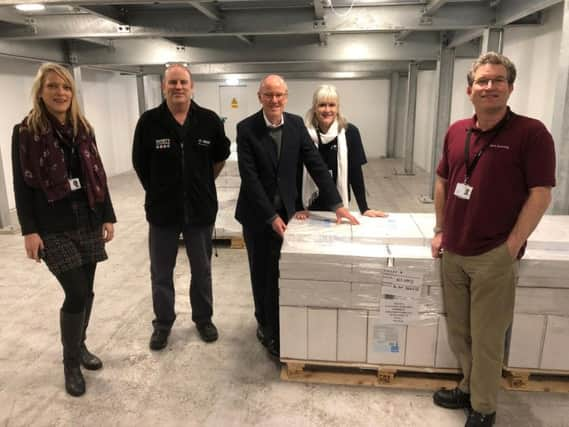Have you heard about the Littlehampton laboratory that's breeding microscopic predators?


The Lineside Industrial Estate is home to a biological facility that manufactures trillions of microscopic predators, called nematodes, a year.
BASF Agricultural Specialities Limited – a division of multinational chemicals company BASF – is the largest producer of the organic pest controllers in the world.
Advertisement
Hide AdAdvertisement
Hide AdNematodes, which can grow up to 1mm in length, are colourless roundworms that are released into soils to hunt down and destroy agricultural and horticultural pests.
The BASF facility, in Eldon Way, produces six species of nematodes designed to eliminate pests such as sciarid flies, vine weevils and caterpillars.
It is also the only production facility in the world that manufactures nematodes to eliminate slugs.
Nematodes occur naturally in soils and marine environments all over the world, but can be drenched over crops and foliage through irrigation systems or spray cans.
Advertisement
Hide AdAdvertisement
Hide AdThe tiny predators seek out an insect host and invade their bodies through openings such as digestive or respiratory tracts.
Once inside, the nematodes multiply and release a bacteria which kills the unfortunate pest within 24 to 48 hours.
To add insult to injury, the nematodes then reproduce inside the cadaverous host and generations of juveniles spread out to hunt for new creepy-crawlies to infect and destroy. They can survive for up to ten days without a meal but once they run out of prey to devour they die, returning to the natural numbers usually found within the environment.
More news:
Clymping woman gets best birthday gift: a 3D-printed armLittlehampton and Horsham fraudsters tried to steal £60million for fake HIV cure research
Advertisement
Hide AdAdvertisement
Hide AdThe whole portfolio is completely biological, so all nematode products can be used by organic growers and cause no harm to non-target species or wildlife.
The tiny beasts begin life in small flasks at the Wick site, before being transferred to a 102,000 litre, 12-metre high fermenter tank to continue the breeding process.
Around 35 people are employed at the site, which has been located on the south coast for more than 30 years, producing 40 trillion nematodes a year.
Advertisement
Hide AdAdvertisement
Hide AdIt started life in the 1980s as the Agricultural Genetics Company, but was taken over by BASF in 2012.
Nick Gibb, MP for Littlehampton and Bognor Regis, was taken on a tour of the facility last week.
“It was inspiring to discover this world-leading biotech company on our doorstep on the Lineside Industrial Estate in Littlehampton,” he said.
“It is a hugely successful company with exciting plans to continue its growth and I was delighted to be able to meet some of the key people behind that success.”
All of the worldwide production, development, distribution and customer service relating to nematodes is orchestrated from the south coast.